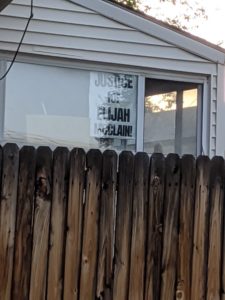An earlier version of my police stories was published in 2014.
I joined an illegal attempt to unionize public employees in 1967. The county got an injunction against picketing. “They can’t do that!” we exclaimed. A black colleague shook his head wearily. “Yes, they can. You people are about to learn what we experience every day.” We marched with our signs on public sidewalks and police surrounded us. Twenty-two, I looked eighteen and I’m white. The young officer arresting me begged me to leave the picket line so he wouldn’t have to do it.
The strikers sang, “like a tree planted by the water, we shall not be moved.” I got in the patrol car, inflated with righteousness. Once in that backseat, the shock of no inside door handles, the metal grill between me and the front, deflated me like a puncture wound. My resolve evaporated. The jail cell was terrifying. Long after, I felt a shiver of fear whenever a patrol car passed me. And I’m white.
***
Fifty years ago, my Mexican mother-in-law scraped by, always behind on bills. She was wielding a chef’s knife on a warm afternoon when a bill collector pushed open the screen door of her tiny house and stepped inside. The next thing I knew, that knife was across the room and quivering in the doorframe, an image still vivid in my mind. The bill collector ran. Soon, a graying Denver police officer showed up. Marcela let him in, but tension was thick. This cop sat down wearily and asked, “you got any coffee?” The ice shattered. She fixed him coffee while explaining. The kids came out of hiding while he commiserated. They discussed how people can’t just walk into your house but throwing knives might not be the best way to respond. He thanked her for that coffee as he left.
***
My teenaged stepson, a long-haired Chicano into drugs and rock n rock, headbands and fringed leather jackets, was a cross between an Apache (an actual part of his heritage) and a hippie. We had a new red Camaro. What were we thinking, letting him drive it? The police officer who stopped him for no reason wanted to know where he stole the car. They impounded the Camaro and took the kid to juvenile hall. We had to bail both out.
***
In 1972 I served on Denver’s Statutory Grand Jury. It did good work, investigated conditions at the county jail. We’re concerned about jail conditions again in 2020. There’s no end to the struggle to improve humankind’s treatment of humankind. A quote I never tire of repeating: “The degree of civilization in a society may be judged by looking at its prisons.” —Dostoevsky.
Grand juries also investigate police shootings. In 1972, Denver cops shot thirteen people, two fatally. The thirteen were seven Chicanos and six blacks, all male and under 30. The cops doing the shooting were white. In every case, the evidence presented left no choice but to exonerate the police. I filed a minority opinion protest. It made the papers but changed nothing.
***
Thirty years ago, I coordinated police officer testing for suburban jurisdictions. My colleagues were sergeants and lieutenants who screened applicants for their departments. I knew cops who saw the seamy side of humanity daily. One said, “I’m a real cop now: I’ve been cursed, spit at and vomited on.” Another told me he led a scout troop to keep a positive balance or the job would poison him.
I knew twenty-year officers who’d never drawn their guns on the job. One of those veterans said he watched young cops dressing to go on patrol, “a knife in the boot, a handgun under the arm—you’d think they were going to war. I never carry a gun unless I have to,” he added. “Do you know how many people get shot by their own guns?”
Another officer told me about stopping a black guy from New Jersey, where “they train them right.” The guy kept his hands on the top of the steering wheel and when the officer asked for his license, did not move his hands, said, “sir, it’s in my right rear pocket,” only reaching to get it when told to do so.
I was going to a meeting at Commerce City PD. Commerce City was working class industrial, with significant Latino population. A detective from Littleton, a white middle class suburb, was with us. As we entered the town, he stared at people on the street, exclaimed, “Why does everyone in Commerce City look suspicious?”
***
Last fall, Judy saw a sign in one of her black neighbor’s yards, “Justice for Elijah McClain.” She wondered what it was about. I regularly pass that house on my way to Whittier Café, never noticed the sign. “How could we not have known about him?” Judy asks now. But we didn’t. His needless death was a blip on the news, our white lives busy. Elijah was black. He was being suspicious.
***
Toni, female and black, was involved in a fender-bender that was the other driver’s fault. A white man, he insisted on calling the cops. A white police officer showed up. Toni became anxious: two white men, one black woman. He asked for driver’s licenses and the other driver flipped open his wallet to reveal, next to his license, a police badge. Toni despaired. But that young Denver cop said, “it’s clear what happened here,” and wrote the other officer a ticket.
Toni told me her story with a sense of wonder. Living in America 150 years after the end of slavery, that outcome was not what she’d learned to expect.


Why did I tear up at the end of the last story? Because Toni had had to learn not to expect fair treatment. And, because I also would not expect fair and just treatment when witnessing cop-on-cop policing. Sad, isn’t it? You want to give that cop a hug just for being human!
When I read your last paragraph, I expected a different outcome. We need to keep talking and protesting all in the hope that the outcome here is one we will learn to expect. Thanks Pat, for helping to keep our justice system and the need for change in the forefront!
Thanks, Pat. I’m white, but I’ve been suspicious of the police every since the 60’s. Looks like we’re on the way to finally seeing change in how they are held accountable, lasting change I hope. But we also need more stories like the one you finished with here, stories of cops with heart, doing the job unselfishly right.
I love this piece. I love the balance, the complexity, the humanity on both sides. These are powerful stories. My best friend from childhood is a cop in North Carolina. Reading his Facebook posts during the riots there was heartbreaking, As he said, “Nobody hates bad cops more than good cops.”